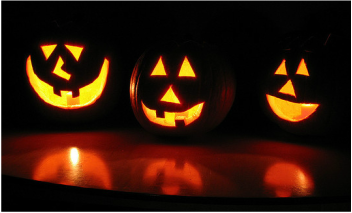
In some churches, harvest festivals now stand in the place of Halloween as a more faithful expression. However, many Halloween traditions originally developed as an alternative to pagan fall revelry. As the nights grew longer and colder, summer ended, and the fall reaping began, many people and cultures also found this to be a time to consider our own mortality, our own reaping. Some of Halloween’s ancient roots stem from a Celtic fear of death, a fear of roving spirits, and a fear of the dark unknown. Homes were lit only by candles, and costumes were worn to scare away any roving spirits that might come near.
Worship in the first Christian churches (c. A.D. 40) likely included prayers for fellow believers who had died. Eventually those prayer times became a day of prayer set aside for the departed. Later, in order to specifically stand in contrast to pagan fears, festivals, and superstitions, the Christian Church introduced the tradition of All Saints’ Day (November 1) and All Souls’ Day (November 2). All Souls’ Day was and is a day of prayer for the departed, while All Saints’ Day was and is a time to especially remember and hallow (honor, venerate) the departed saints. However, in the 1500s the Western Church split into Catholics and Protestants with one point of dissension being how to define a saint. Despite these remaining distinctions, most Christians still celebrate some form of All Saints’ Day.
As the tradition of All Souls’ and All Saints’ took hold, the evening prior to All Saints’ Day, known as All Hallows Eve, became a time for Christians to mock death and to remember the sentiment of 1 Corinthians 15:55: “Where, O death, is your victory? Where, O death, is your sting?” The word “Halloween” is simply a contraction of “Hallows Eve” and can be affirmed by Christians as a time to hallow those who have passed, to celebrate the power of Christ over death through the resurrection, and to even dress up in costumes that ridicule and demean the futile and feckless dominion of eternal death.
Although Halloween has become a highly secularized and indulgent celebration, we must remember that Christians are often called to offer alternatives and antidotes to an infirmed culture. The word “holiday” is an integration of “holy day” and “holy” means to set apart or sanctify. For some, the holy day of Halloween is simply a day of excess sweets, gory costumes, and unfettered partying. Rather than divorce ourselves from this secularized Halloween, Christians can instead reengage our culture and remind people of Halloween’s ancient Christian roots. We can ease fears of the unknown. We can encourage people to consider the death and resurrection of Christ and how death holds no eternal power. And we can help others find in Christ deep fulfillment and meaning in a joyous life now and in an eternal life to come. All of this is certainly worthy of celebration.
